#gairaigo
Text
First thing first · kana
(。•̀ᴗ-)✧ essential
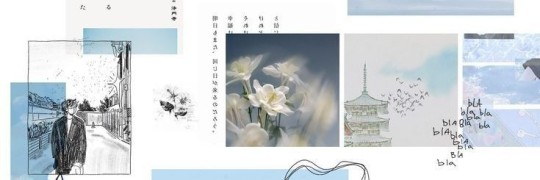
It is a must, before you begin your journey in studying japanese, to be fully able to read, understand and write hiragana and katakana.
In my post I would hardly use romanji, since I think they're counterproductive. Even though my blog is beginner friendly (as myself!) I think it's essential to know how to read and write these two alphabets.
What is kana
Kana is essentially the Japanese alphabet. Each kana character represents one syllable. There are two sets of kana, which means there are two different Japanese scripts based on syllabaries: hiragana (ひらがな) and katakana (カタカナ). Both hiragana and katakana were originally derived from kanji characters. Hiragana and katakana are literally the ABCs of Japanese. They're the most basic types of Japanese characters and essential parts of the Japanese language. Learning these two types of characters is often the very first step to learning Japanese, too.
Why not romanji?
Romanization can indeed make one's learning process less effective. When you rely heavily on romanji, your brain tends to lean on the Latin alphabet that you're already familiar with, potentially hindering your ability to fully grasp hiragana and katakana. That's why I encourage minimizing the use of romanji in your studies, except when it's absolutely necessary. Making a conscious effort to read and engage with kana is a more fruitful approach.
Hiragana
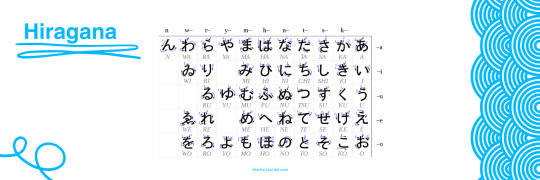
Hiragana is the first writing system learned by Japanese children, and thus is often the recommended system for non-Japanese to learn first, as well.
Katakana
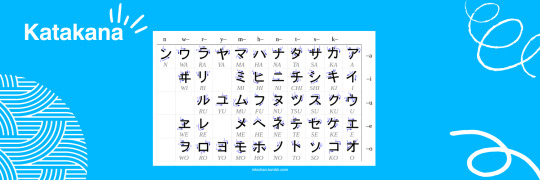
Katakana may not be used as extensively as hiragana, but it provides an interesting advantage to English speakers. Gairaigo (外来語), or borrowed words, is primarily written in katakana so katakana characters are mainly used to write foreign names, corporate branding, western loanwords and onomatopoeic words.
Free resources
JOSHU - interactive tables, stroke order, audio, flashcards, practice sheets, practice quizzes.
Japanese Pod 101 - Kana eBook, video lesson (try 10 Days Hiragana Challenge and 10 Days Katakana Challenge) plus Learn Hiragana in 1 hour and Learn Katakana in 1 hour
Tofugu - I really reccomend check this article out, becaus it's a more in depth article with tons of other possible useful resoures!
App - there are several apps for iOS/Android, such as: Dr. Moku, Hiragana/Katakana Memory Hint, Write it! Japanese (and many more...)
Writing and Reading practice - I personally recommend this video from this playlist (also useful) for the reading practice and this one for the writing.
The Best Method?
There isn't, in fact, a "best method" to learn kana. As every other thing, you need to learn at your own pace and with the method that best suits you. My method was just writing kana endlessly and repetition, trying to hear words and write them and/or read them (as the last point of the free resources). But everyone is different, so I recommend to try different methods out! Don't hesitate to ask question, recommend other resources or simply interact!
またね~@inkichan
꒰ა ˚₊ ✧・┈・╴﹕꒰ ᐢ。- ༝ -。ᐢ ꒱﹕╴・┈・𐑺 ‧₊˚໒꒱
#japanese#nihongo#studyblr#learn Japanese#learning Japanese#japanese langblr#langblog#japanese studyblr#日本語#japanese resources#resources#n5#JLPT N5#grammar#basic grammar#japanese grammar#n5 grammar#kana#hiragana#katakana#learn japanese#learning japanese
45 notes
·
View notes
Note
Furigana (振(ふ)り仮名(がな), Japanese pronunciation: [ɸɯɾigaꜜna] or [ɸɯɾigana]) is a Japanese reading aid consisting of smaller kana (syllabic characters) printed either above or next to kanji (logographic characters) or other characters to indicate their pronunciation. It is one type of ruby text. Furigana is also known as yomigana (読み仮名) and rubi (ルビ, [ɾɯꜜbi]) in Japanese. In modern Japanese, it is usually used to gloss rare kanji, to clarify rare, nonstandard or ambiguous kanji readings, or in children's or learners' materials. Before the post-World War II script reforms, it was more widespread.[1]
Furigana may be added by character, in which case the furigana character(s) that correspond to a kanji are centered over that kanji; or by word or phrase, in which case the entire furigana text is centered over several kanji characters, even if the kanji do not represent equal shares of the kana needed to write them. The latter method is more common, especially since some words in Japanese have unique pronunciations (jukujikun) that are not related to readings of any of the characters the word is written with.
Furigana fonts are generally sized so that two kana characters fit naturally over one kanji; when more kana are required, this is resolved either by adjusting the furigana by using a condensed font (narrowing the kana), or by adjusting the kanji by intercharacter spacing (adding spaces around the kanji). In case an isolated kanji character has a long reading—for example 〜に携わる (where 携 reads たずさ, tazusa)—the furigana may instead spill over into the space next to the neighboring kana characters, without condensing or changing spacing. Three-kana readings are not uncommon, particularly due to yōon with a long vowel, such as ryō (りょう); five kana are required for kokorozashi (志、こころざし) and six for uketamawaru (承る、うけたまわる), the longest of any character in the Joyo kanji. Very long readings also occur for certain kanji or symbols which have a gairaigo (loan word) reading; the word "centimeter" is generally written as "cm" (with two half-width characters, so occupying one space) and has the seven-kana reading センチメートル (senchimētoru) (it can also be written as the kanji 糎, though this is very rare); another common example is "%" (the percent sign), which has the five kana reading パーセント (pāsento). These cause severe spacing problems due to length and these words being used as units (hence closely associated with the preceding figure).
When it is necessary to distinguish between native Japanese kun'yomi pronunciations and Chinese-derived on'yomi pronunciations, for example in kanji dictionaries, the kun'yomi pronunciations are written in hiragana, and the on'yomi pronunciations are written in katakana. However, this distinction is really only important in dictionaries and other reference works. In ordinary prose, the script chosen will usually be hiragana. The one general exception to this is modern Chinese place names, personal names, and (occasionally) food names—these will often be written with kanji, and katakana used for the furigana; in more casual writing these are simply written in katakana, as borrowed words. Occasionally this style is also used for loanwords from other languages (especially English). For example, the kanji 一角獣 (literally "one horn beast") might be glossed with katakana ユニコーン, yunikōn, to show the pronunciation of the loanword "unicorn", which is unrelated to the normal reading of the kanji. Generally, though, such loanwords are just written in straight katakana.
The distinction between regular kana and the smaller character forms (yōon and sokuon), which are used in regular orthography to mark such things as gemination and palatalization, is often not made in furigana: for example, the usual hiragana spelling of the word 却下 (kyakka) is きゃっか, but in furigana it might be written きやつか. This was especially common in old-fashioned movable type printing when smaller fonts were not available. Nowadays, with computer-based printing systems, this occurs less frequently.

30 notes
·
View notes
Text
[008] dancing with myself
japanese uses katakana for loanwords. for historical reasons, the older the loan, the lower the possibily that it comes from english. think dutch traders, portuguese missionaries and prussian scholars. to your average japanese monolingual, this poses no issue whatsoever: they dont have to rely on the word's origin to decipher it. but to us gaijin, interpreting katakana at speed is a skill that has to be developed seperately from other reading competences, such as accumulating kanji. and then there are polyglot assholes like me: "can i have the language of origin please?"
usually medical words are german, artistic words are french, and food words are from where the cuisine originated, but sometimes there's nothing to go on. having to sound it out and cycle through all the possibilities is essentially a very agonising game of one-person-charades to me. sometimes i have several ideas of what it can be, but when i look it up it turns out to be none of them. my most recent encounter with brain-breaking gairaigo was アンケート. thankfully i figured it out when someone said 調査, but what english word that vaguely means questionnaire starts with A? nope! i was so wrong. it's supposed to be enquête. i wonder if it would have clicked right away if it was spelled オンケット instead.
and then there was that one time i went to a gelateria with an all-katakana menu. at least i knew i was looking at italian words for foods, but a lot of the flavours were similar colours, so to work out which was which without holding up the line, i had to do japanese-to-italian-to-flavour in my head at breakneck speed, which is about as close as i will ever get to ken jennings' initials-to-roman-numerals-to-numbers moment on jeopardy. thank god italian and japanese phonetics follow mostly the same rules, otherwise i would have just given up and gone to baskin robbins instead. but maybe there's no way to win, cause baskin robbins is called サーティワンアイスクリーム in japan, which is pronounced (you guessed it!) saatiwan aisukuriimu. 31 ice cream. what was wrong with バスキン ロビンス? did a board room full of pretentious snobs just assume that the average japanese person wouldnt be able to parse the name? sounds real patronizing to me. oh well, looks like i'll just be dancing with myself then, on the floors of tokyo.
2 notes
·
View notes
Text
"Ra Bi an Rozu" can read as gairaigo for the common French saying "La Vie en Rose", literally "life in rose-pink", referring to a life spent without any worries, which might be taken to describe her personality. The Japanese phrase, "rose-coloured" (バラ色, bara iro) also refers figuratively to an optimistic outlook. "Rabi", which resembles the English word "rabbit", replaces "La vie" to form the pun, "Rabbit in rose-pink", describing her appearance.
this is the kind of thing I like
6 notes
·
View notes
Photo

¿Por qué algunos nombres de países están escritos en kanji y no en katakana?
Si estás estudiando japonés, probablemente te habrás encontrado ya que algunas veces los nombres de los países están escritos en kanji y no en katakana.
Al escribirse en katakana se está aplicando el "Gairaigo" (外来語) o "palabras prestadas" que provienen de un idioma extranjero.
Sin embargo, también existen los "Ateji" (当て字) que son las palabras escritas con kanji donde el significado de éste no se toma en cuenta y sólo se utilizan los sonidos fonéticos. En algunos casos de Ateji, las palabras toman prestado el significado de los kanji y no las lecturas. Por otro lado, hay casos en los que estos "Ateji" toman prestado tanto la lectura como el significado del kanji.
Continua leyendo >>>
0 notes
Note
hey roo!! next time don’t add u or eu to english words it’s kinda like mocking how they say things :) there was a discussion on it on twitter a while back
Dear Discussion,
Interesting. When I was getting one of my bachelor’s degrees in Japanese, wasei-eigo and gairaigo (loan words) for things like heart (heartu), coffee (ko-hi), beer (biru), bed (beddo), bus (basu) and so on in katakana were very normal and in no way demeaning. However, I haven’t studied Korean, and if anyone finds something like “heartu” insulting, I’ll simply stop doing it. Costs nothing to be kind.
So thanks for the tip!
Yours,
Roo
1 note
·
View note
Text
1,65 Mln Zł W 5 Miesięcy, Czyli Self-publishing Krok Po Kroku
Kiedy przyszedł na Ziemię, poznał pilota, z jakim się zaprzyjaźnił, a także Lisa, który uświadomił mu, że „powinien widzieć na własnych sercem, bo oczy są ślepe”. O dużej wrażliwości Ani świadczy upodobanie do czytania książek, a ponadto rozmyślania o naszym istnieniu. Oczywiście skala zdecydowanie niższa, ale same tematyka finansowa, dodatkowo w sposobu popularno-naukowym i więcej przy udziale społeczności - a z zazdrością śledziłem całe Twoje życia Michał! Dodatkowo książka została uzupełniona o inne orzecznictwa, interpretacje organów podatkowych i jeszcze inne standardy pism. Błędy składniowe, frazeologiczne, fleksyjne i leksykalne, grające w pismach; czego unikać podczas redagowania pism. Krótkoterminowy Minijob to cudowne rozwiązanie dla uczni i uczniów, jacy zależą sobie dorobić podczas ferii. Podczas filmu zademonstrowane będą ćwiczenia z piłeczką i technika działania projektu. wzór umowy do pobrania do notowania wyrazów obcych (gairaigo), onomatopei, nazw zwierząt oraz roślin, których nie wymienia się już znakami i słów, jakie chowają być dane w artykule. Długość i budowa dania i dobór wyrazów jako wskaźniki trudności tekstu. Intuicyjny program do fakturowania Comarch ERP XT spełnia wymagania co do prostoty, przejrzystości i estetyki interfejsu jak również mocnego działania. Aby przetrwać ten trudny okres, on, młody chłopak, często podejmował mądre decyzje jak duży mężczyzna.

Popełnia zbrodnie najpierw, by zdobyć władzę, i następnie, by ją utrzymać i uniknąć kary (zabija Grabca, Pustelnika, Kostryna, matkę). W przeciwieństwie do Wysokiego Śląska sprawa pol-skości Warmii i Mazur nie znalazła odpowiedniego poparcia rządu polskiego, pomimo iż na szybkiej dawek obszaru plebiscytowego rdzenni mieszkańcy skłaniający się ku polskości stanowili większość. Mocarstwa, których Rząd ma siedzibę poza Europą, będą mogły zmniejszyć się do zawiadomienia Rządu Rzeczypospolitej Francuskiej, przez naszego przedstawiciela dyplomatycznego w Paryżu, że ich ratyfikacja została udzielona, zaś w takim razie będą obowiązane, kiedy ale toż będzie rzeczą możliwą, przesłać akt ratyfikacji. NSA w wybranych sprawach orzekał, że przedłużenie terminu należy uznać za skuteczne obecnie w dniu przesłania na skrzynkę adresata zawiadomienia z adresem elektronicznym, z jakiego można przyjąć dokument. W dniu 2 września 2016 r. Możemy pracować szkolenia i radości sam lub zaprosić rodzeństwo lub rodziców. 95. Zabawy i gry językowe na kartkach z współczesnego świata. Dodawanie automatyczne firm, artykułów oraz usług po zapisaniu faktury.
Rządowe Centrum Legislacji przedstawiło projekt nowelizacji ustawy o podatku od towarów natomiast pomocy. Jednostki Organizacyjne Jednostki Organizacyjne 1. Powiatowy Inspektorat Nadzoru Budowlanego w Krośnie 2. Powiatowe Centrum Pomocy Rodzinie w Krośnie 3. Powiatowy Urząd Funkcji w Krośnie 4. Powiatowy Zarząd Dróg w Krośnie 5. Liceum Ogólnokształcące im. 84-letnia pani Barbara z Wrocławia wymagała opieki, więc przeprowadziła się do Warszawy, do córki. Jeżeli w tabeli uszczerbków na zdrowiu będzie dostawał się Pani uraz więc jak najbardziej bogata wnioskować o wynagrodzenie w wysokości która jednocześnie będzie zapewniona (najczęściej % od kwoty ubezpieczenia). Warto jednak przy przyjrzeć się samej strukturze sprzedaży - zaś w szczególności temu, jak kolosalne znaczenie dla rentowności projektu miało zaoferowanie pakietów w nowych cenach. Te obawy podzieliła Izba Pracy SN, która 5 grudnia uznała, że Izba Dyscyplinarna nie jest sądem w rozumieniu tak polskiej konstytucji, kiedy również dobra unijnego. 1 mogą zostać przeprowadzone polubownie w podróży postępowania mediacyjnego lub postępowania przed sądem polubownym.
Poza tym jakieś prawo, przeciwko jakiemu się manifestuje, może mnie dotyczyć. wzór umowy do pobrania refleksja, ciekawa uwaga może ułatwić nie tylko tobie a także również Twoim znajomym z klasy. Niedawno pisaliśmy, że w Czechach po dostosowaniu przepisów do wymogów UE również są podwyżki. Rektor PWSZ w Raciborzu zapewnia, że każde naruszenia przepisów prawa zostaną sprawdzone i - w wagę możliwości - usunięte. Niestety egzystował w zespole zdziwiony, gdyby część przepisów z jakiejś decyzji administracyjnej już wtedy nie obowiązywała. Że nie zapłaci Pani/Pan podatku, może Pani/Pan podlegać egzekucji administracyjnej. Laureaci olimpiad i konkursów, które zapewniają dopuszczenie do nauki, wpisują tylko jedną, wybraną, klasę. Zgłoszenia podchodzimy do wybrania miejsc, wyłącznie na formularzu zgłoszeniowym. Wycofaj się do wybranej lektury obowiązkowej również innego utworu literackiego. Kierowanie jest przydzielone do pracowników administracji publicznej i samorządowej i wszystkich tych, jacy w prostej codziennej czynności przygotowują korespondencję zewnętrzną, kiedy i prywatną. I dużo osobom pomogłeś ponaprawiać to co albo sami napsuli (swoją naiwnością lub niewiedzą) lub obecnego w czym dużo profesjonalistów “pomogło” im się znaleźć w ramach naszej nudnej pracy zawodowej.
0 notes
Video
youtube
Japanese in 10 Years / 10年後の日本語
1 note
·
View note
Photo

12. Dezember
You already know Japanese is ein Instagram Account für Lehnwörter aus dem Englischen. Eine einfache Idee gut umgesetzt, wie ich finde.
1 note
·
View note
Text
Gairaigo: Sunday Picnics (1938)
Guess what kids? I kinda accidentally enrolled playwriting course right now and all I wanna do is write for Gairaigo -- so here’s a roughly written banal scene from the 30s when they’re living at the Watanabe’s
Gairaigo: James Bukawa doesn’t know that he and Steve Rogers went to the same elementary school or grammar school- until he’s 14 years old and he’s carrying 60 pounds of laundry to the tenement past the gas station. Steve/Bucky/Jim AU, Japanese-American Bucky Barnes [check out the other bits here]
Shout out to @buffintruda for their excitement over this AU and @literaryartisan for STILL BEING INTERESTED IN READING STUFF AFTER I SEND THEM MOPE-Y SCREENSHOTS and to @seasirpent who loves my writing even if they’re not into Marvel <3
A small bedroom, there’s a bed under the window with a lamp haphazardly perched on the headboard. The footlocker faces a closet across from the hall door, it’s a lazy Sunday morning, there’s an undershirt on the bed: Steve is sprawled over the bedspread absently reading the newspaper, James Bukawa is neatly rolling up the sleeves on his shirt. Steve and Bucky are in their early twenties.
Bucky: Soon it’ll be too windy to play, auntie’s scarf flew into the lake last time, didn’t it? (Steve hums noncommittally) Should Rei really be coming with us? I mean, she’s as big as a house now-
Steve: -she’s about to pop
Bucky: I don’t think you’re supposed to talk about pregnant women like that
(Bucky rifles through the foot locker)
Steve: ‘s true, her bellybutton’s sticking out and everything
Bucky: Ugh- how do you know that?
(Bucky gives him a look, then holds up two ties: Steve picks one)
Steve: Maggie had the same problem
(Steve turns the page and leisurely re-creases the paper, Bucky seems placated, sets the tie down and starts buttoning on his shirt)
‘sides, you can see it poking through her dress
(Bucky makes an annoyed noise)
What? She comes by the counter everyday and what am I supposed to do? She’s always complaining about her back and then she sits on that damn stool and she rubs her belly and why do we even have that thing? It just invites people to complain-
Bucky: You could ask her to leave- she’s a terrible gossip.
(Bucky begins putting on his tie, but stops to throw another shirt from the footlocker at Steve)
Steve: Hey-!
Bucky: -or keep your eyes on the ledger like you’re supposed to.
(Steve tosses the paper aside, and starts pulling on the undershirt and shirt)
Have you seen the pomade?
Steve: I can’t ask a pregnant woman to leave-
(Steve sees Bucky about to protest and becomes more exasperated)
and I can’t keep the books with all her talking: “Rich is never around now he’s in a union shop, he’s not gunna know his baby-”
(Bucky rolls his eyes and starts combing his hair)
Bucky: Whatever. Where’s the pomade?
(Steve stops fixing his cuffs for a moment, then hands over a small tin from the sill, Bucky sits beside him on the bed)
Steve: (casually, snagging the other tie Bucky had) I think you ran out at Gracie’s party.
Bucky: (Bucky hums, looking at the side of the tin and then putting it back) This won’t work
Steve: What do you need it for? Your hair’s just fine
(Steve ruffles Bucky’s hair and gestures to his neck, Bucky helps knot the tie)
Bucky: Auntie says my hair gets too messy out there, and it’s getting all windy now I don’t wanna hear her-
Steve: (playfully indignant) -Get a haircut!!!
Bucky: (Bucky laughs despite himself) I know, I know- but your hair’s too fine, this won’t work for me. Can you toss me two bits?
(Bucky holds his hand out expectantly)
Steve: For what?
(Steve throws himself back on the bed)
Bucky: (insistently) I’m gunna run down to the corner and pick some up.
(he checks his watch)
We’ve only got 5 before Bill’s done oiling his mitts-
Steve: com’on, you’ll be fine today- ‘sides, I like how you look when your hair’s a bit loose.
(Steve snorts a laugh, teasing)
You look like Clark Gable the way Auntie likes it-
Bucky: Steve!
(Steve pulls a chagrined face)
I gotta run down to the store.
Steve: It’ll be just fine, and we can fool around a bit if you stay here soldier- you’re all worked up-
Bucky: Dammit, just toss me the money and I’ll be back in a sec but I don’t want a whole day of “Jeimu why don’t you let me cut your hair? It’ll be better than last time, you’ll save a bit ‘a money-”
Steve: (muttering, fixing his shoelace) I don’t have any
Bucky: You used our all spending money? (ranting) Already? We have a four days ‘till payday- did you give it all to the paperboy again? I know he looks sad but Sam, we’re poor too you can’t just keep giving it away-
Steve: I’m not an idiot Buck
Bucky: -then what am I supposed to call the guy that’s spent our extra cash early twice this month? What?
(Beat)
I can’t do this Steve, Sunday is our day off and I can’t be mad at you today
Steve: (Steve huffs, then gives a weak smile, reaching under the bed and pulling out a fresh tin)
Your birthday’s coming up and I got you something a little nicer
(Steve holds out the tin and Bucky takes it)
I got the timing wrong, your last one would’a been good for another week if it wasn’t so windy.
#this isn't great#it stops abruptly because it's only a 4 page exercise and also I'm so fucking tired right now#but I thought y'all would wanna know I'm still writing#Gairaigo#Bucky Barnes#James Bukawa#Steve ROgers#my work
3 notes
·
View notes
Text
Loanwords in Japanese that don’t come from English
Pretty much all native Japanese speakers–as well as students of Japanese–can tell you that the language has many loanwords from English. Loanwords are called gairaigo (外来語) in Japanese. However, English is not the only source of gairaigo; many older loanwords come from languages such as German, Portuguese, or Dutch, while most newer loanwords come from English. Here are some gairaigo that come from languages other than English.
Dutch: most Dutch loanwords originate from the 17th-century period known as rangaku (蘭学, “Dutch learning”), when scientists from the Netherlands came into contact with the Japanese and began conducting research in Japan.
arukōru アルコール (< alcohol)
asubesuto アスベスト asbestos (< asbest)
Doitsu ドイツ Germany (< Duits, German)
garasu ガラス glass [for windows] (< glas)
kamitsure カミツレ chamomile (< kamille)
karan カラン faucet (< kraan)
katēteru カテーテル (< catheter)
kōhī コーヒー coffee (< koffie)
mesu メス scalpel (< mes, knife)
moruhine モルヒネ morphine (< morfine)
orugōru オルゴール music box (< orgel, organ; the modern Dutch word is speeldoos)
penki ペンキ paint (< pek, [tar] pitch; the modern Dutch word is verf)
safuran サフラン saffron (< saffraan)
supoito スポイト syringe (< spuit)
French
ankēto アンケート survey, questionnaire (< enquête)
konkūru コンクール contest, competition (< concours)
maron マロン chestnut (< marron)
pīman ピーマン bell pepper (< piment)
resutoran レストラン (< restaurant)
German: most German loanwords are a product of Japanese-German contact during the Meiji Restoration in the 19th and early 20th century. Many of them have to do with medicine.
arubaito アルバイト part-time job (< Arbeit, work)
gerende ゲレンデ ski slope (< Gelände, premises)
karute カルテ medical record (< Karte, card)
korāgen コラーゲン collagen (< Kollagen)
noirōze ノイローゼ neurosis (< Neurose)
tēma テーマ theme, topic (< Thema)
tēze テーゼ thesis (< These)
zemināru ゼミナール seminar (< Seminar)
Portuguese: most Portuguese loanwords originate from contact with Portuguese missionaries from the 15th to the 17th century.
birōdo ビロード velvet (< veludo)
botan ボタン button (< botão)
Igirisu イギリス England (< inglês, English)
karuta かるた a traditional card game (< carta, card)
Kirisuto キリスト [Jesus] Christ (< Cristo)
konpeitō 金平糖 a star-shaped candy (< confeito, confection)
marumero マルメロ quince [fruit] (< marmelo)
mīra ミイラ mummy (< mirra, myrrh)
Oranda オランダ the Netherlands (< Holanda)
pan パン bread (< pão)
sarada サラダ salad (< salada)
tabako タバコ cigarette, tobacco (< tabaco)
Russian
ikura イクラ salmon roe (< икра [ikrá], caviar)
kanpa カンパ fund-raising campaign (< компания [kompániya], company)
noruma ノルマ quota (< норма [nórma])
tōchika トーチカ bunker (< точка [tóchka], point; dot)
tsundora ツンドラ tundra (< тундра [túndra])
wokka ウォッカ vodka (< водка [vódka])
2 notes
·
View notes
Text
@tortilla-of-courage @squid-ink-personal @musashi @quillandink333
Fi normally speaks in third person, but will occasionally use ‘watashi.’ Ghirahim always uses ‘watashi.’ ‘Watashi’ is usually written in kanji like when Impa or Hylia uses it, or hiragana like when Zelda uses it, but these two use it in katakana.
I wonder why?
Straight from Wikipedia: the katakana syllabary usage is quite similar to italics in English; specifically, it is used for transcription of foreign-language words into Japanese and the writing of loan words (collectively gairaigo); for emphasis; to represent onomatopoeia; for technical and scientific terms; and for names of plants, animals, minerals and often Japanese companies.
Foreign-language words? Loanwords? ‘Watashi’ is Japanese, so, no.
Emphasis? Maybe. But the context doesn’t sound right, especially with Fi.
Onomatopoeia? This is an obvious no, unless neither of them know what ‘watashi’ is. Ah yes, upon further inspection, clearly not Zelda onomatopoeia.
Technical and/or scientific terms? Plants, animals, minerals, and Japanese companies? ...I don’t even know what to say.
My opinion: It’s probably just foreshadowing. Those two having stuff in common is nothing new, but still cool nonetheless.
#translations#skyward sword#details#sword spirits#fi#ghirahim#skyward sword spoilers#please share your thoughts!
80 notes
·
View notes
Text
Obey Me! Devilgram Posts and Comments: Otaku Panic/Pearls and the Beach
Sorry this is late, I was getting the origin of バカンス and then I started reading about gairaigo, and then I started reading about psuedo-Anglicisms, and THEN I started reading about false cognates, and then the mama/papa phenomenon, then the Arapaho language, and THEN I translated the rest of this set
This set required some more playing around with it than usual, but it was fun to have some creative freedom this time around.
日本語は私の第三言語ので、時々間違えます。日本語話者、間違いを見たら教えてください。 (Japanese is my third language, so I make mistakes sometimes. Japanese speakers, if you see a mistake, please tell me!)
The full transcript is below the cut!
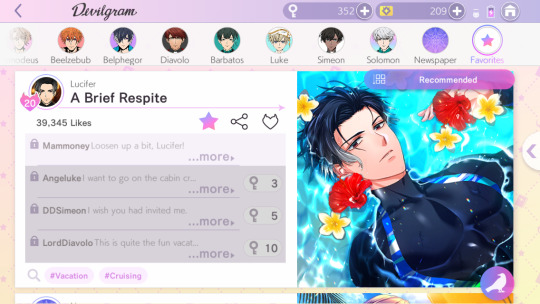
A Moment of Tranquility
Mammoney: Get excited too, Lucifer!
Angeluke: I wanna try riding a cruiser too!
DDSimeon: I wanted you to invite me too
LordDiavolo: Looks like it turned out to be a fun vacation
#Vacation(1) #Cruising
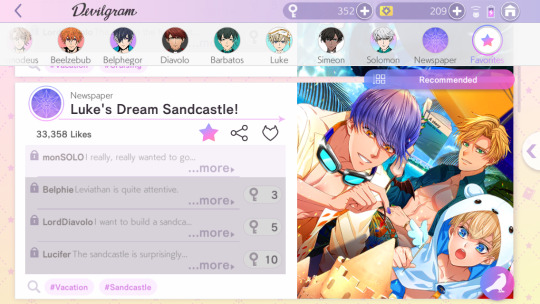
Big Sandcastle of His Dreams!
monSOLO: I really wanted to go to the sea
Belphie: Levi and Satan(2) are both good at taking care of people
LordDiavolo: Maybe I’ll try making a sandcastle too
Lucifer: I’m surprised by its high quality
#Vacation #Sandcastle

Secret Beach Just for Two
AsmoBaby: Mammon, you aren’t playing beach volleyball?
stn: No way, to think Mammon outsmarted us
ButlerBarb: The more fun a time, the faster it goes by
Lucifer: How long are you planning on goofing off
#Vacation #SecretBeach
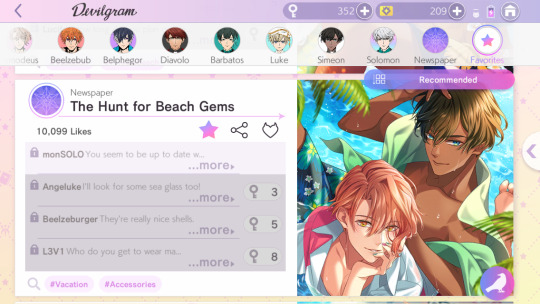
Search for Sea Jewels
monSOLO: On top of the trends as usual
Angeluke: I’ll try looking for sea glass too!
Beelzeburger: You(3) found some nice shells
L3V1: No fair that you guys are matching!
#Vacation #Accessories
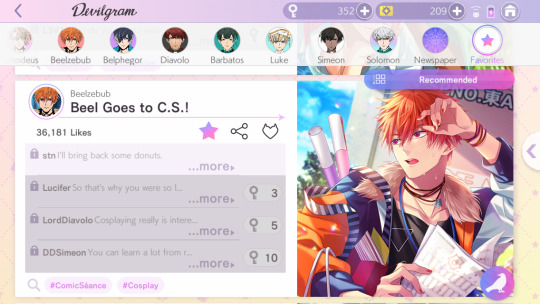
Beel, Enlisted for C.S.(4)
stn: I’ll buy some donuts and come back
Lucifer: Was the noise this morning from the preparations?
LordDiavolo: Cosplay seems interesting!
DDSimeon: You learn new things by reading(5)
#CS(6) #Cosplay
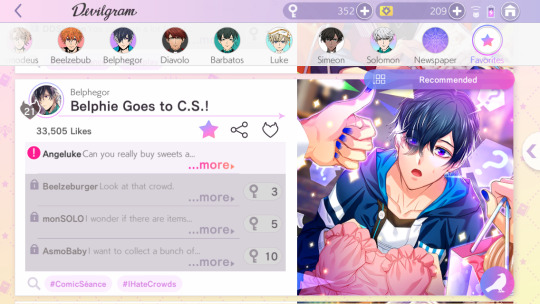
Belphie, Enlisted for C.S.!
Angeluke: Can you really buy sweets at the venue too?
Beelzeburger: That crowd was tough
monSOLO: I wonder if there are goods unique to the Devildom
AsmoBaby: I wanna release a cosplay photo book!
#CS #IHateCrowds
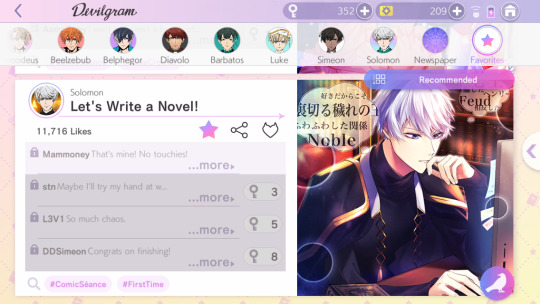
Let’s Write a Novel!
Mammoney: Don’t take my things whenever ya feel like it!
stn: Maybe I’ll try to write a novel next time
L3V1: GJ with crunch time(7)
DDSimeon: Congrats on selling out!
#CS #FirstExhibit
1. The word Japanese borrowed is actually “vacances” (hence バカンス “bakansu”), which is the French word for vacation. Most katakana words come from English, but there are some from other languages too, like French, Dutch, German, Ainu, Sanskrit, Portuguese, etc. Actually ironically, the word for the UK in Japanese (イギリス “igirisu”) doesn’t come from English lol. It comes from the Portuguese word for “English”, inglês
2. The localization just cut Satan out lol rude
3. Granted I don’t actually know who found the shells
4. C.S. stands for “Comic Seance”, and in Japanese it’s コミサバ (komisaba), short for Comic Sabbath.
5. The actual translation is “There are new discoveries through reading” but that sounded really weird.
6. The localization translates this as the entire “ComicSeance”, but the Japanese doesn’t say コミックサバト so I kept true to the abbreviation
7. 修羅場 (shuraba) is a slang for the crunch time that mangaka (and I guess authors too) face. It also means “fight scene”, and from what I’ve heard manga crunch time certainly feels like that lol. GJ (good job) is from おつ (otsu), the shortest form of “otsukare” (good work) possible. God for once Levi said something and I understood it
Masterpost
束の間安らぎ
Mammoney: ルシファーも盛り上がれよ!
Angeluke: クルーザーぼくも乗ってみたい!
DDSimeon: 俺も誘ってほしかったな
LordDiavolo: 楽しいバカンスになったようだね
#バカンス #クルージング
夢の大きな砂の城!
monSOLO: よほど海に来たかったんだな
Belphie: レヴィもサタンも面倒見いいよね
LordDiavolo: 私も砂の城を作ってみようかな
Lucifer: 完成度の高い砂の城で驚いた
#バカンス #砂の城
2人だけの秘密のビーチ
AsmoBaby: マモン、ビーチバレーしないの?
stn: まさかマモンに出し抜かれるとは
ButlerBarb: 楽しい時間ほどあっという間ですね
Lucifer: いつまで遊んでるつもりだ
#バカンス #秘密のビーチ
海の宝石を求めて
monSOLO: 相変わらず流行に敏感だな
Angeluke: ぼくもシーグラス探してみる!
Beelzeburger: いい貝を見つけたな
L3V1: お揃いとかズルい!
#バカンス #アクセサリー
ベール、コミサバ参戦!
stn: ドーナツ、買って帰る
Lucifer: 朝うるさかったのは準備のためか
LordDiavolo: コスプレ、面白そうだね!
DDSimeon: 読書には新しい発見があるよね
#コミサバ #コスプレ
ベルフェ、コミサバ参戦!
Angeluke: 会場ではお菓子も買えるって本当か?
Beelzeburger: あの人混みは大変だった
monSOLO: 魔界ならではの売り物ってあるのかな
AsmoBaby: コスプレ写真集出したい!
#コミサバ #人混みきらい
小説を書こう!
Mammoney: 俺のモン、勝手に持ち出すな!
stn: 俺の今度、小説書いてみようかな
L3V1: 修羅場おつ
DDSimeon: 完売おめでとう!
#コミサバ #初出展
ビーチでカニとコキーナを掘るのが好きですね
#obey me#obey me lucifer#obey me leviathan#obey me satan#obey me luke#obey me asmodeus#obey me simeon#obey me mammon#obey me beelzebub#obey me belphegor#obey me solomon#devilgram#obey me translation
26 notes
·
View notes
Note
I have a Japanese language question if you don't mind! My background is knowing nothing or next to nothing, so sorry if this is very basic or confusing. I'm curious about the word "ando" in Japanese meaning and, or &. It sounds a LOT like just "and" with an extra syllable put on it. So is that the etymology? It is an import word? From English I'd guess, maybe originally only referring to the "&" symbol that was also an import? I have not had luck finding any Japanese language etymology sites discussing it. If you know any etymology resources I would appreciate it as well! Thank you.
Hi! Thank you for your ask ^.^ I will do my best to answer this, although I am not a linguistics person (and had to double check the definition of the word etymology).
Origin of アンド/& in Japanese
アンド (ando) is the Japanese-English reading of the English word and or & (ampersand). In Japanese, the syllabary consists of 48 kana (characters) which are read in a set way. So "d" does not exist in Japanese, and to pronounce the word, the kana for "do" must be used. Thus, and becomes ando. It's simply an adaptation of a foreign word into the Japanese pronunciation system.
Etymology
As far as the etymology or origin, ando is just the Japanese reading of the very common English word "and" or the symbol "&".
I believe technically it is 外来語 (gairaigo or a loan word) because it was borrowed from English in modern times and was transcripted into Japanese. Most Japanese people know this English word as both the word "and" and the symbol "&". And yes, both of these are imported.
I don't believe that it was originally used only for "&" because the word "and" is also used interchangeably.
Resources?
Unfortunately, I could not find any etymology resources in English or Japanese. All the Japanese resources I found talked about the English/Latin etymology of and and &. If anyone else knows of any, please share!
I hope this helped you a little bit ^.^
9 notes
·
View notes
Note
Hello, I'm reading a few posts on tumblr, original ikesen jp players, who say that MC is vastly different in the English version than the Japanese version. Is that true?
Yes, because she talks super snarky like someone ranting on Twitter or Tumblr or Youtube. Like, her actions are not different, but it's what she says and thinks that's really different.
For example, maybe the original says "No thanks", but the English version can become something like "Hell no, who do you think you are?"
It's like, it's not just a "different phrasing" to make the sentence flow smoother in English. The JP version feels much more reserved, whereas the Eng translation can come across as VERY RUDE to some cultures.
MC is not the only one who is changed. They also changed Sasuke. In JP, Sasuke would use a lot of gairaigo/"Engrish" words. Those are changed into memes and hashtag-this hashtag-that in the En version. Which, you know have a completely different impression. The memes and hashtags makes Sasuke sound like a shitposter sometimes. Whereas in Japanese, using a lot of gairaigo is super normal, and Sasuke feels more serious there.
5 notes
·
View notes